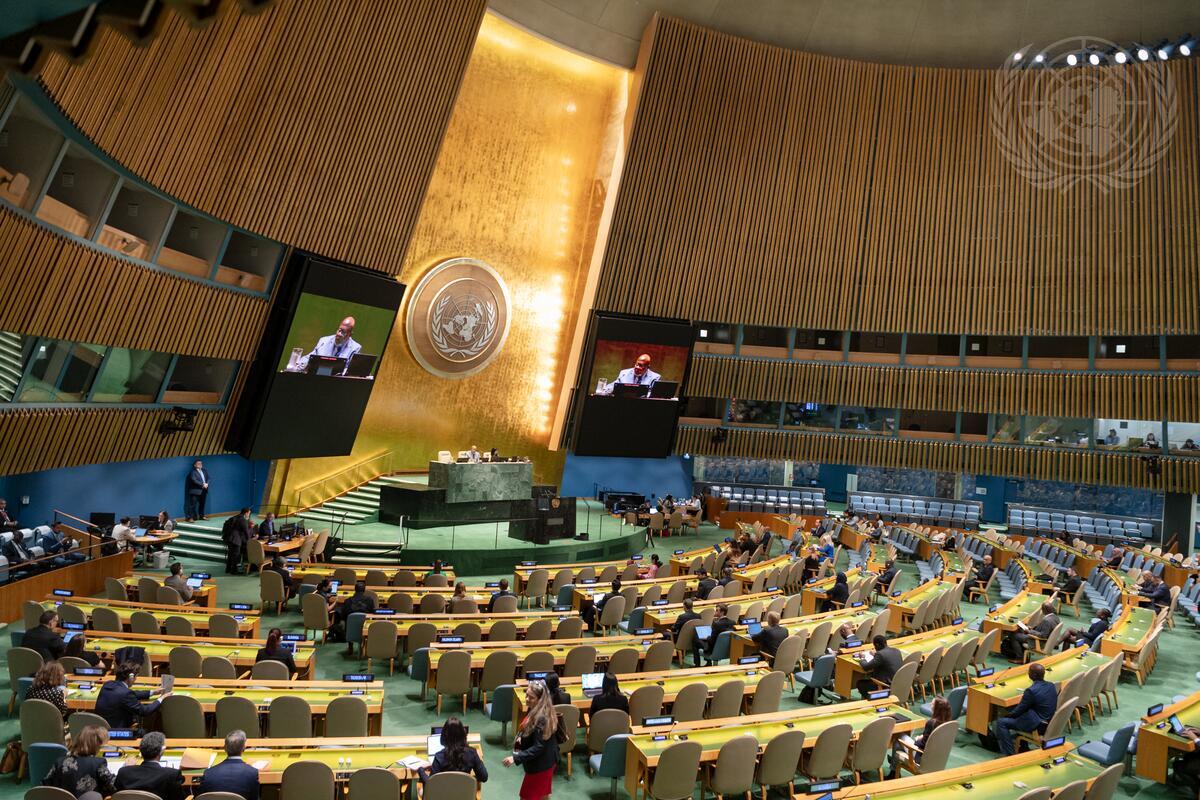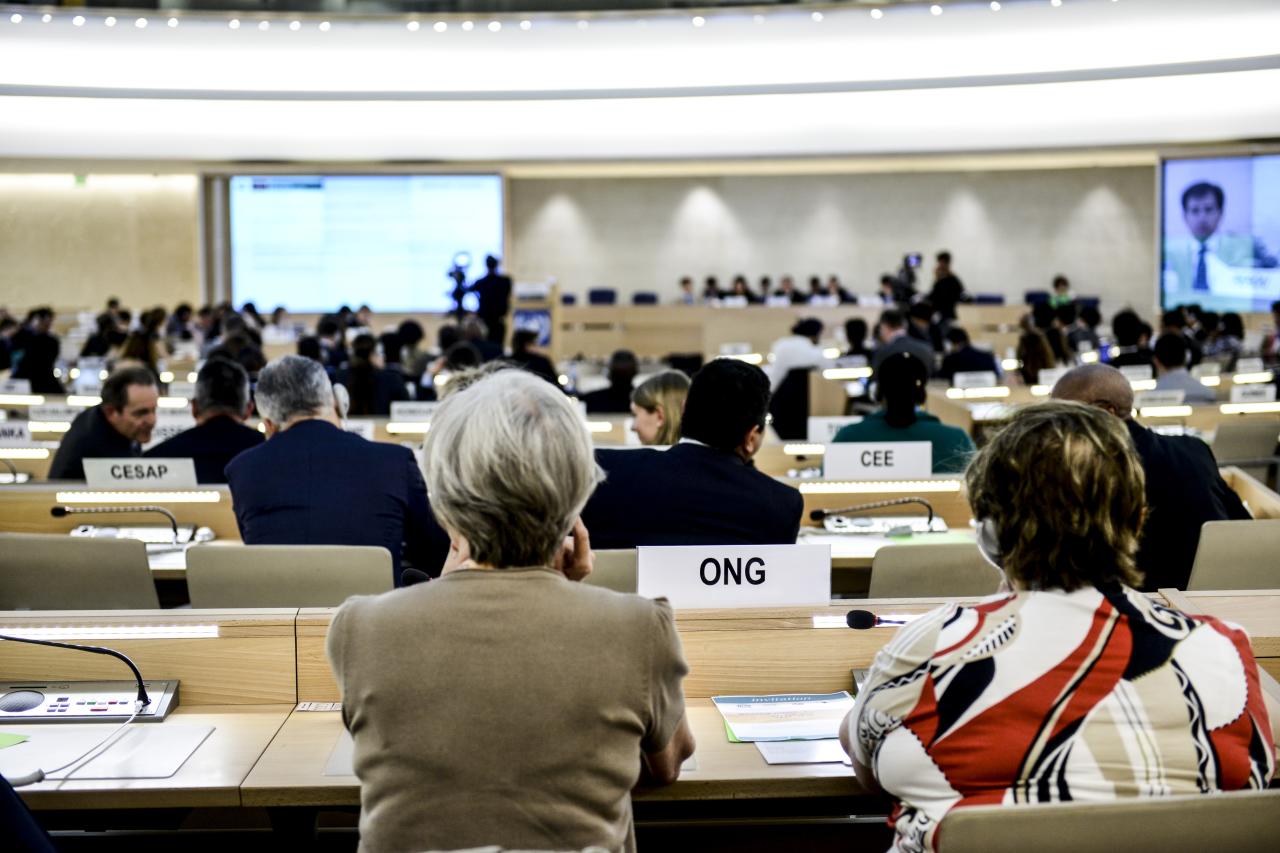On 9 September 2022, 52 NGOs sent the below letter to States, HRC Bureau and co-facilitators on the need to address challenges to civil society participation in light of restrictions, including due to the Strategic Heritage Plan (SHP).
We write to you in follow up to previous correspondence, including the joint letter from January 2022 sent to the HRC President and Bureau which summarized civil society’s expectations for the Human Rights Council in 2022.
Civil society participation is a cornerstone of the Human Rights Council. Given continuing restrictions to civil society participation, including the Council’s adoption of efficiency measures to address the UN’s financial shortfalls; the COVID-19 pandemic; and the ongoing Strategic Heritage Plan, we call on you to continue to ensure full participation of civil society and that civil society are fully consulted in the making of decisions that affect civil society participation and access to the Council. We are concerned that without such consultation, decisions on issues relating to participation and procedure will be taken without full consideration of all key stakeholders, to the detriment of the Council’s effectiveness.
In terms of civil society participation, hybrid participation and side events in particular must be urgently addressed.
Side events
The Strategic Heritage Plan (SHP) works at the Palais des Nations, which began in 2021 and are expected to be completed in 2025, have had a negative impact on the work of civil society organizations. During a meeting between the UNOG director-general and civil society, on 27 June 2022, organizations were informed that it will not be possible to hold side events until the beginning of 2025 due to the works around the SHP but that ultimately the distribution of meeting rooms is dependent on the Human Rights Council. On 10 August 2022, civil society organizations were informed that “the Secretariat intends to allocate some space for side events at a reduced level compared to the pre-COVID-19 period”: a maximum of one side event per NGO, lasting a maximum of 1 hour, while noting that “it may not be possible to accommodate all requests”.
The High Commissioner Report A/HRC/51/13 stressed that “since March 2020, there have been no non-governmental organization in-person side events in the Palais des Nations during sessions of the Human Rights Council and the Working Group of the Universal Periodic Review, resulting in ongoing limitations to civil society engagement with the Council and the Universal Periodic Review mechanism to date.”
Civil society organizations had consistently raised concern at the fact that holding side events at the Palais des Nations was suspended with no alternatives provided between HRC 44 and HRC 50. While we appreciate the efforts to find solutions and the announced measures for HRC 51 on a pilot basis, we believe it is imperative that states continue to work with UNOG and the HRC Secretariat to ensure that the implementation of the Strategic Heritage Plan enables the reinstatement of side events in the Palais des Nations in line with the situation previous to Covid-19.
Side events are key opportunities for states and civil society to address pressing human rights situations and a key tool of the human rights council. This space is essential for the Council’s ability to fulfill its mandate, as States and NGOs can bring situations of imminent risk or mounting human rights crises to the Council’s attention. It is also one of the only avenues to highlight the root causes of human rights violations occurring in countries not formally addressed by the Council as part of its programme of work. Additionally, side events around the UPR are an important opportunity for civil society to engage with states to address the human rights situation of countries under review.
Hybrid participation modalities and accessibility
Building upon the inputs of civil society and states, the report of the High Commissioner A/HRC/51/13 concludes that “the recipe for effective crisis response and for trust and resilience is a more systematic investment in meaningful, safe and inclusive participation at all levels, coupled with effective measures to protect access to information and an enabling environment for debate as well as the security and holistic protection of those who speak up.”
We reiterate the recommendation of the report that states and other actors “enable and institutionalize meaningful online participation in hybrid meetings, addressing particular challenges in accessing and participating effectively in online spaces”.
Following the restrictions to in-person participation due to the COVID-19 pandemic, the use of remote participation tools (such as through video statements and remote access to informal consultations), a long-standing demand of organisations, has proven to be an effective way to promote a more inclusive and accessible Human Rights Council for civil society. While in-person engagement of civil society will remain indispensable to the work of the Council, we urge you to maintain the hybrid participation modalities, even after the easing/lifting of COVID-19 measures. Remote participation enables the engagement, in particular of organisations based outside of Geneva, by providing a space for under-resourced civil society actors who would otherwise not be able to attend the Council in-person. The possibility to pre-record video statements allowed for the council to hear from more diversified voices, including from organizations working on the ground. The ability to engage remotely also provided an opportunity for victims and their families to speak directly to the Human Rights Council.
The High Commissioner Report A/HRC/51/13 stressed that the move to online and digital platforms “helped to expand outreach and engagement to previously excluded or underrepresented communities”. It added that “several United Nations human rights treaty bodies have held virtual meetings and briefings with civil society and victims at the local and grass-roots levels”.
Indeed, during the pandemic, the UN Human Rights Treaty Bodies benefited from the use of remote participation to maintain their activities while ensuring the participation of civil society. With the re-establishment of in-person attendance, we urge you to maintain the hybrid modality for the sessions and pre-sessions, as well as for briefings with civil society organisations.
We also urge you to address current challenges on the provision of hybrid meetings, such as the allocation of inadequate venues (rooms) equipped with insufficient tools (e.g., interconnected microphones, speakers, cameras, and others). This has negatively impacted the engagement of remote participants and their integration with the discussions taking place in-person, particularly during briefings with CSOs. Additionally, we urge you to tackle interpretation-related issues, which have weakened both remote and in-person participation. In some cases, access to interpretation has been unavailable or limited to some types of meetings, or even amounted to a reduced duration of dialogues with State delegations and briefings with CSOs, undermining the proper functioning of the UN Treaty Bodies.
Regarding the provision of accessibility for in-person attendance, we also draw special attention to the inadequacy of the rooms for persons with disabilities, especially wheelchair users, those who rely on animal assistance, and those who are blind and use canes. The allocation of rooms with large spaces to ensure their mobility must be ensured, while guaranteeing the participation of all interested civil society representatives with the necessary material to fully engage in meetings and briefings.
We thank you for your consideration and hope that we can keep working together for a more accessible Human Rights Council.
Sincerely,
- Addameer Prisoner Support and Human Rights Association
- AGE Platform Europe
- Al Mezan Center for Human Rights
- Al-Haq
- Asian Forum for Human Rights and Development (FORUM-ASIA)
- Asian Legal Resource Centre
- Association for Progressive Communications
- BADIL Resource Center for Palestinian Residency and Refugee Rights
- Bahrain Institute for Rights and Democracy (BIRD)
- Cairo Institute for Human Rights Studies (CIHRS)
- Center for Reproductive Rights
- Centre for Civil and Political Rights
- Child Rights Connect
- Civic Coalition for Palestinian Rights in Jerusalem (CCPRJ)
- CIVICUS: World Alliance for Citizen Participation
- Commonwealth Human Rights Initiative (CHRI)
- Conectas Direitos Humanos
- Coordination des Associations et des Particuliers pour la Liberté de Conscience
- DefendDefenders (East and Horn of Africa Human Rights Defenders Project)
- European Office Church of Scientology for Public Affairs and Human Rights
- Fundacion para la Mejora de la Vida, la Cultura y la Sociedad
- Global Centre for the Responsibility to Protect
- Global Initiative for Economic, Social and Cultural Rights
- Gulf Centre of Human Rights
- Habitat International Coalition
- HelpAge International
- Humanists International
- International Commission of Jurists
- International Council of Jewish Women
- International Federation for Human Rights (FIDH)
- International Federation on Ageing
- International Network for the Prevention of Elder Abuse (INPEA)
- International Service for Human Rights (ISHR)
- Jubilee Campaign
- Justitia Center for legal protection of human rights in Algeria
- Peace Brigades International
- Save the Children International
- Set My People Free
- Sexual Rights Initiative
- Southern Africa Human Rights Defenders Network
- Syrians for Truth and Justice
- Taafi initiative
- TB-Net
- The Community Action Center / Al-Quds University
- The International Bar Association’s Human Rights Institute (IBAHRI)
- The Syrian Legal Development Programme (SLDP)
- The World Evangelical Alliance
- United Religions Initiative
- West African Human Rights Defenders Network
- Women’s Centre for Legal Aid and Counseling
- Women’s Federation for World Peace, Int’l
- World Organisation Against Torture (OMCT)




